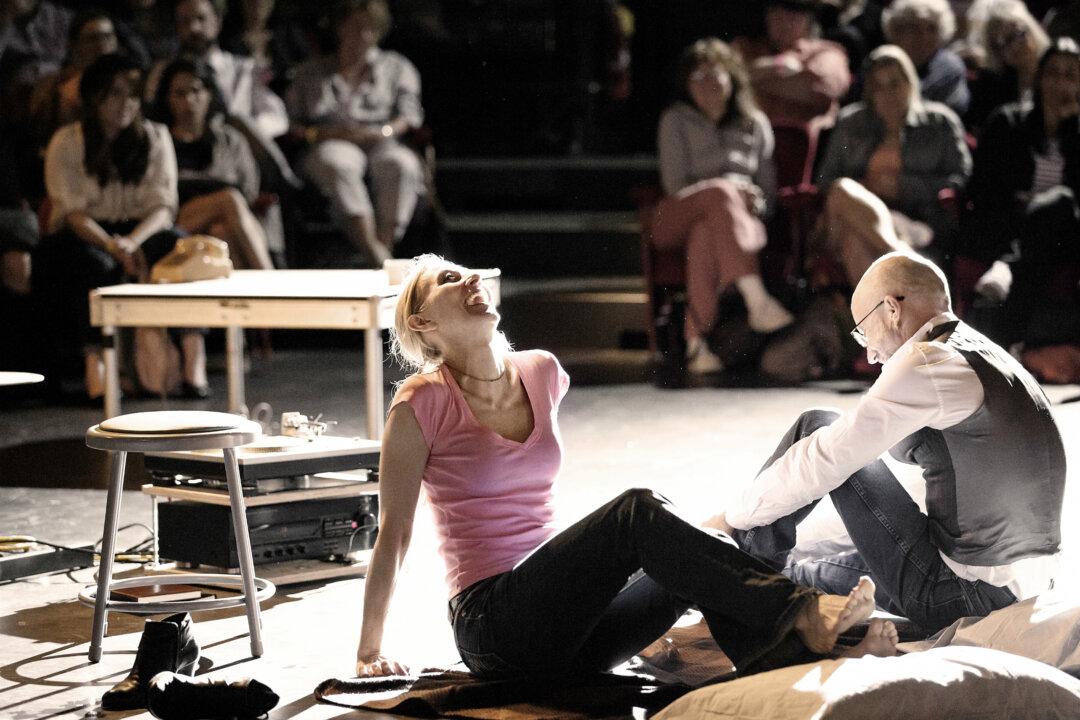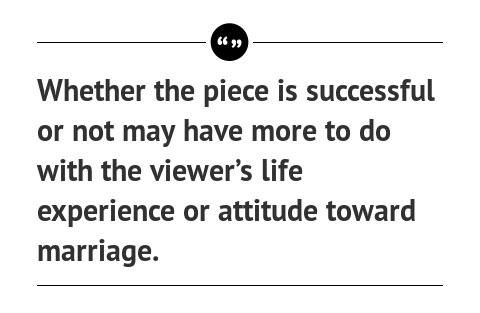NEW YORK—New York Theatre Workshop’s stage has been transformed into three playing areas, initially walled off from one another, in Ingmar Bergman’s “Scenes From a Marriage.” Utilizing Emily Mann’s version in English, Belgian director Ivo van Hove—noted for past mind-bending concepts—piques the audience’s interest with his unusual take.
Using Jan Versweyveld’s spare set pieces, three actor-couples portray the two protagonists, Johan and Marianne. Depending on the color of an audience member’s wristband (given out when picking up one’s ticket), one may enter on the youngest of the couples, Johan 1 (Alex Hurt) and Marianne 1 (Susannah Flood), worrying over her unexpected pregnancy and what should be done about it.
After about 30 minutes, the audience segments are moved to the next playing area where they view another aspect of the couple’s relationship. Seen is the now older pair, Johan 2 (Dallas Roberts) and Marianne 2 (Roslyn Ruff), alternately fighting and making up.
In a brief sequence, Marianne, a lawyer, counsels Mrs. Jacobi (Mia Katigbak) regarding the latter’s desire to obtain a divorce. “There is no love in the marriage,” the woman complains. When asked to define love, however, she is at a loss for words.
Both intriguing and disconcerting is that another playing area, with another couple, can be slightly observed through a window. When voices are raised one hears unclear words; otherwise, one sees only an undefined dumb show.
As time passes, the relationship hits more and more snags.
Johan 3 (Arliss Howard) abruptly admits to Marianne 3 (Tina Benko) that he has been unfaithful. Furthermore, he wants to leave her and the two children for this other woman, the unseen Paula—who he admits is not very attractive. Although Marianne tearfully pleads with Johan not to destroy their marriage of 20 years, he is adamant.
Now a 30-minute intermission intervenes. When the audience re-enters, it is to an entirely different setting. The walls of the smaller rooms have been removed, and we find ourselves in an enormous space, set up in the round. The audience, which has formerly been separated into smaller groups, now finds itself together as one. Together, it seems, for the final parting with all hands on deck.
With all three couples onstage, almost each line of dialogue cleverly mimics the previous character’s utterance, very much like a song sung as a round.
The content however is deadly, as the thrust of the scene is on divorce. Marianne (all three, at the most mature stage) insists she will not stay with Johan, who (all three) meekly pleads to be taken back.
After much intense, and verging on violent, argument, the Johans sign the divorce agreement.
It is a triumphant—and sad—moment.
One may be left with mulling over one’s own relationship with one’s important other. Are couples meant to stay with one another forever? Can successful compromise ever be achieved? Is it better to turn the other cheek than to deal with differences head-on? Or should one take courage in hand and go forward to seek one’s true self and personal destiny?
Cast members are fine throughout. No attempt has been made to match particular types with the particular role. And it doesn’t matter.
Others in the cast are Erin Gann, Emma Ramos, and Carmen Zilles.
Has Mr. van Hove’s tripartite approach been successful? In my opinion, the answer lies in the mind of each audience member. I suspect that considering the piece successful or not may have more to do with the viewer’s life experience or attitude toward marriage.
In any case, the production is highly theatrical, and at three and a half hours’ playing time (including the half-hour intermission), one will have been exposed to a considerable slice of life.
‘Scenes From a Marriage’
New York Theatre Workshop
79 East 4th St.
Running Time: 3 hours, 30 minutes (30 minute intermission)
Tickets: 212-460-5475, 212-279-4200, or NYTW.org
Closes: Oct. 26
Diana Barth publishes New Millennium, an arts publication. For information: [email protected].






